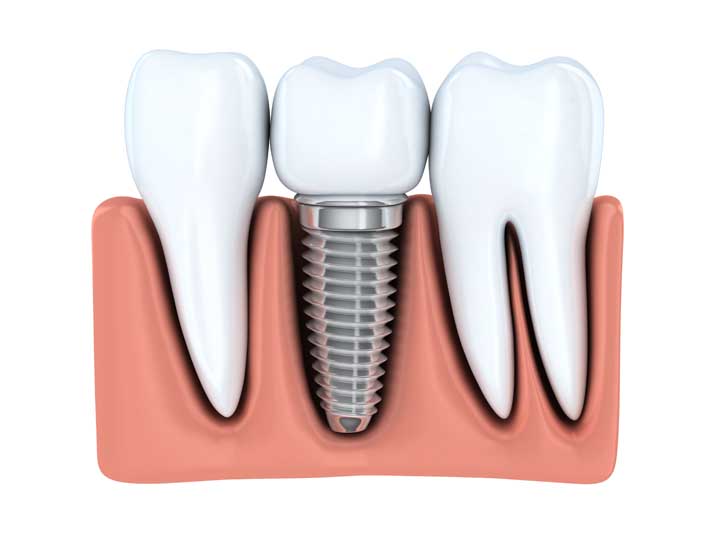Charlotte Dental Implants
Dental Implants
Old age, injuries and other oral health issues can all lead to tooth loss. Once a gap is present, it opens up the possibility for infection and could lead to more serious dental problems down the road. Depending on your situation, there are options that Charlotte dentist can offer to get your smile back on track.
Treatment Process
The purpose of a dental implant is to replace a missing tooth. A dental crown is attached to an abutment, which is anchored into the jaw using a titanium post. This post is placed directly into the gum and bone where it will fuse with the jaw bone. Its purpose is to secure and stabilize the tooth, creating a permanent solution.
Bridges & Partial Dentures
While you’re healing after the post has been placed for a dental implant, SouthEnd Dentistry offers temporary options, so you won’t have to go a day without a beautiful smile. Temporary bridges and partial dentures can also keep your teeth from shifting while your gum and jaw heal. Our dentist can discuss with you which option is better for your particular case, and provide you with a custom fitting device.

The Benefits Of Dental Implants
Dental implants have a number of unique benefits which make them our preferred method of restoring missing teeth at SouthEnd Smiles. First, they last longer than any other method of restorative dentistry.
With proper care, your dental implants will last you 30+ years and you will likely keep your implant for the rest of your life. In contrast, partial dentures must usually be replaced every 5-10 years, and fixed dental bridges usually only last about 10 years. Dental implants do not require any special care beyond proper brushing and flossing, and seeing our dentist for regular six-month cleanings and oral exams.
In addition, dental implants allow a very secure hold for an implant-supported restoration (a crown, bridge, or denture). Your implant is permanently attached to your jaw bone, so the restoration that is attached will never move or shift. Your teeth will look and feel completely natural while you’re eating, speaking, smiling and laughing, allowing you to feel confident about your smile.
Implants also prevent bone loss. When you lose a tooth, the underlying bone below the socket will begin to disintegrate. You can lose up to 25% of this bone within a year of losing a tooth. However, dental implants stimulate the bone and prevent this from happening, ensuring your jaw stays strong and healthy.
Why You Should Consider A Dental Implant
Still not sure why you should consider a dental implant instead of an alternative restorative treatment like dental bridges or dentures? There are a few reasons that it may be a good idea to consider a dental implant.
First and foremost, you need to get treatment as soon as you can to keep your jaw bone healthy. After you lose a tooth, the underlying bone is no longer stimulated by chewing, and will begin to deteriorate. Neither dentures or dental bridges can prevent this, since they do not stimulate the jaw bone.
In contrast, dental implants support and strengthen your jaw bone. Getting an implant soon after losing one or more teeth will ensure that the underlying bone does not deteriorate or weaken, and will preserve your facial appearance. You’ll also get valuable peace of mind, knowing that your smile will remain strong for years to come.
That’s another reason you should consider a dental implant. They last longer than any other type of restorative dental treatment. Typically, an implant will last at least 30 years, and if you brush and floss properly and follow our dentist instructions for implant care, you will likely be able to keep your implant for the rest of your life.
That means that, overall, a dental implant will usually be a better investment than a comparable restorative treatment like a dental bridge or a set of dentures. Bridges usually last up to 10 years, while dentures may need to be replaced as frequently as every 5 year, depending on your oral health.
While the initial cost of a dental implant will usually be higher than a bridge or denture, it will pay for itself over your lifetime, and you’ll also get peace of mind, a more secure restoration, and a smile that looks and feels more natural. For all of these reasons, you should definitely consider dental implants.
How Do Implants Prevent Bone Loss?
Dental implants prevent bone loss because they stimulate the bone and gum tissue around the implant site. Your natural teeth stimulate the underlying bone when you chew, bite and smile. Pressure is sent through the root and into the jaw, keeping it strong.
After you’ve lost a tooth, this pressure is no longer sent into the jawbone. In response, it will begin to weaken. Dental implants prevent this because they function as an artificial tooth root. The implant is placed directly into the jaw bone and as it heals, it bonds with your jaw tissue. Once your restoration is attached, the implant will send pressure into your jaw bone to stimulate it and keeping it strong.
Understanding Osseointegration: The Key To Permanent Smile Restoration
Osseointegration is the reason that dental implants are so strong, durable, and long-lasting. This is the process by which the implant actually bonds permanently with the surrounding tissue and becomes a natural part of your mouth.
Titanium is used for dental implants because it has the unique ability to “osseointegrate” with bone. The bone tissue around titanium will begin to grow and fuse the implant in place. For all intents and purposes, the implant becomes a natural part of your mouth after it has undergone this process.
However, osseointegration can take a long time, which means that implant treatment requires patience. Usually, the process takes about 3-6 months.
Determining If You Need A Dental Implant
You need a dental implant if you’ve lost one or more of your natural teeth, and you are not interested in restoring your smile with dentures or a dental bridge. A dental implant may also be the right choice for you if you have one or more severely damaged teeth that may require tooth extraction and replacement.
Dental implants are very versatile and can be used to restore one, several, or all of your missing teeth, depending on the type of implant restoration used. Crowns, bridges, and dentures can all be attached to implants to provide excellent results and restore your smile.
If you are not sure that a dental implant is right for you, we recommend consulting with our dentist at SouthEnd Dentistry. At your appointment, our dentist will perform a comprehensive examination of your mouth, complete with x-rays and digital imaging.
Then, our dentist can discuss all of your options for restorative dentistry in detail, provide you with information about the benefits of dental implants, and discuss your budget and other details that may be relevant to your case. This ensures that you have all of the information you need to make the best choice for your long-term oral health.
3D CBCT by Sirona
At SouthEnd Dentistry, we pride ourselves in providing cutting-edge technology to ensure a quick, seamless treatment experience for all of our patients. That’s why we’re excited to announce we now have a 3D CBCT scan by Sirona! This technology allows us to analyze the position and orientation of your teeth roots, nerves, sinus structure, and more. With this information, our dentist and the team are able to provide a thorough diagnosis and ensure the long-term stability of your dental restorations better than ever before. These highly detailed 3D images help us plan all aspects of your care with the utmost precision and accuracy. Best of all, the scans take less than a minute and are completely painless, so you can enjoy a swift, relaxing appointment.
3D Cone Beam Computed Tomography (CBCT) By Sirona
At SouthEnd Dentistry, our dentist is dedicated to investing in the latest cutting-edge dental technology. We’re always striving to provide the best possible patient experience and better outcomes.
That’s why we have invested in a powerful 3D CBCT (Cone Beam Computed Tomography) scanner by Sirona, a leader in dental technology. This powerful machine allows our dentist to provide better results during the process of dental implant surgery.
CBCT is a special type of dental x-ray technology. It uses a scanner that emits a cone-shaped x-ray beam. This scanner rotates around your entire head, capturing hundreds of different 2-dimensional images of your face, jaw, and head.
Then, these 2D images are fed into a special computer program, where they’re turned into a life-like, accurate 3D reconstruction of your own unique anatomy. Using the power of CBCT, the team at SouthEnd Dentistry can gain unique insights into your oral anatomy.
They can visualize and identify your teeth, assess your jawbone, view nerves and your sinus structure, and much more. With these highly-detailed 3D images, it’s easy to plan your treatment and determine if dental implants are right for you.
Not only that, but these 3D images can be used to develop a precise and accurate treatment plan. Our dentist will be able to plan your dental implant surgery to ensure the best possible location, stability, and outcome for your procedure.
3D CBCT with our Sirona machine is fast and easy, too. It’s totally painless and the entire process of scanning your head and face takes only about a minute. Interested in learning more about 3D CBCT from Sirona and how we use it at SouthEnd Smiles? Contact us now for an appointment.
Understanding The Process Of Placing Implants Using 3D CBCT By Sirona
Typically, you will get a 3D CBCT scan of your face and head at your first dental implant consultation with our dentist. Then, he will use these scans and the results of your oral exam to determine whether or not dental implants are the right choice for restoring your missing teeth.
If our dentist approves you for implants, he will use the 3D scans of your face taken by our Sirona CBCT machine to begin planning your implant procedure. Using these scans, he can determine the optimal position for each implant, and he can avoid blood vessels, nerves, sinuses, and other facial structures that may interfere with the placement process.
Then, you’ll come in for your surgical appointment. Using your surgical treatment plan as a guide, our dentist will drill into your gums and jaw tissue with unparalleled precision. Thanks to the precise 3D scans taken of your mouth, he can perform surgery more quickly, and reduce the overall invasiveness of your procedure.
Another benefit of this is that you’ll spend less time under anesthesia and in the dentist’s chair. Charlotte emergency dentist our dental team will be able to perform your surgery more quickly because we’ll have a “roadmap” of your mouth that will help us avoid complications. Contact us today to learn more.

Built to Last
A dental implant is a permanent, low-maintenance solution to tooth loss. It requires no special care. In fact, if you brush and floss regularly, it should last you the rest of your life.
Built to Last
A dental implant is a permanent, low-maintenance solution to tooth loss. It requires no special care. In fact, if you brush and floss regularly, it should last you the rest of your life.

